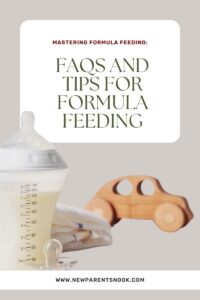Some links on our blog are affiliate links, meaning at no extra cost to you, we may earn a commission if you purchase through them. We participate in the Amazon Affiliate Program, and we recommend products we believe in. Your support helps us keep providing valuable content. Thank you!
Whether you’re unable to breastfeed, choose to combine breast and formula feeding, or decide that formula is the best option for your family, this guide is designed to navigate you through every aspect of formula feeding.
Choosing the Right Baby Formula: A Guide for New Parents
Navigating the baby formula aisle can be overwhelming for new parents with the abundance of options available.
Understanding the differences between cow’s milk-based, soy-based, hypoallergenic, and specialized formulas is crucial to making an informed decision that meets your baby’s nutritional needs.
Here’s a breakdown of the types of baby formula and expert tips for choosing the right one.
Types of Baby Formula
Cow’s Milk-Based Formula:
The most common type of formula, designed to mimic breast milk’s nutritional profile, is made from cow’s milk that’s been altered to be easier for babies to digest.
It’s fortified with the right balance of carbohydrates, proteins, and fats, along with vitamins and minerals essential for growth and development.
Soy-Based Formula:
An alternative for infants who are lactose intolerant or unable to consume dairy for health or dietary reasons.
Soy formulas provide a similar nutritional value to cow’s milk formulas but are derived from soy protein.
Hypoallergenic Formula:
Designed for babies with allergies to cow’s milk protein or soy. Hypoallergenic formulas are made with proteins that are extensively hydrolyzed, breaking them down into smaller parts to make them easier to digest and less likely to cause an allergic reaction.
Specialized Formula:
These formulas cater to specific medical conditions or dietary needs, such as premature birth, reflux, or metabolic disorders.
They are typically prescribed by a pediatrician based on the individual needs of the baby.
How to Choose the Best Formula for Your Baby
1. Assess Dietary Needs:
Consider any known allergies or family history of allergies, lactose intolerance, or special dietary requirements that might influence your choice of formula.
2. Consult Your Pediatrician:
Before deciding on a formula, discuss your options with your pediatrician. They can provide guidance based on your baby’s health and nutritional needs, especially if you’re considering hypoallergenic or specialized formulas.
3. Read Labels Carefully:
Look for formulas that are iron-fortified, a crucial nutrient for infant development.
Check the list of ingredients for any potential allergens and ensure the formula provides a complete nutritional profile for your baby’s age.
4. Consider Baby’s Preferences and Response:
Babies may react differently to various formulas due to taste or how well they can digest them. It may take trying a few types before finding the one that suits your baby best.
Pay attention to how your baby responds after feeding—signs of comfort and satisfaction, as well as any adverse reactions such as fussiness, gas, or allergic symptoms.
5. Be Wary of Marketing Claims:
While many formulas boast added benefits, such as enhancing brain development or immune support, it’s important to focus on the formula’s basic nutritional value and safety.
The most important aspect is that the formula meets your baby’s dietary needs.
Tips for Reading Formula Labels
- Check for Essential Nutrients: Ensure the formula contains essential nutrients like iron, vitamin D, calcium, and DHA (an omega-3 fatty acid important for brain development).
- Understand the Protein Source: Whether it’s cow’s milk protein, soy protein, or hydrolyzed protein, knowing the source can help you choose the best option for your baby’s tolerance and health needs.
- Examine the Carbohydrate Content: Lactose is the main carbohydrate in breast milk, but some formulas use different sugars.
Choosing the right baby formula is a decision that requires careful consideration and, often, a bit of trial and error.
Remember, the goal is to find a formula that supports your baby’s growth and development while ensuring they are happy and healthy.
Always keep open communication with your pediatrician to navigate this important choice confidently.







